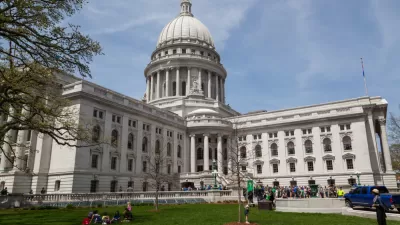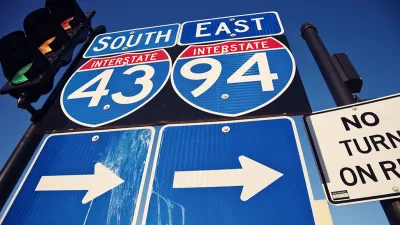Though the governor's office remains staunchly opposed to new taxes, the Wisconsin State Legislature is searching for politically viable ways to fund transportation infrastructure improvements at the local level.
"The [Wisconsin] state Assembly will soon debate a bill allowing counties to levy a 0.5 percent sales tax to rebuild crumbling local streets and highways," according to an article by Steven Walters.
Any county tax would require a local referendum, and funding raised by the surtax "would be divided according to a formula based on the miles of roadways maintained by each county, city, village and town," adds Walters. The "State Pothole Repair Act," as the bill is known, is authored by Republican Dean Knudson, and is expected to face stiff resistance in the State Senate.
The debate surrounding the bill, however, indicates the ongoing infrastructure funding needs in the state of Wisconsin. Walters quotes Dan Bahr, of the Wisconsin Counties Association, in discussing the benefits of a potential surtax. Taxes, however, are strongly opposed by Gov. Scott Walker, who last February killed a transportation funding program that relied on an increased gas tax and other user fees in favor of bond funding and debt service.
Around the state, "62 of the 72 counties now levy a 0.5% sales tax to help pay for other local programs. If those same 62 counties levied a new half-cent sales tax to maintain local highways, streets and bridges, it could raise about $333 million a year," according to estimates from the state Department of Revenue.
Craig Thompson, executive director of the Transportation Development Association, is also quoted in the article, noting that the "Pothole Repair Tax" does not allow counties the discretion to fund transit or other forms of transportation.
FULL STORY: The Pothole Repair Act

Alabama: Trump Terminates Settlements for Black Communities Harmed By Raw Sewage
Trump deemed the landmark civil rights agreement “illegal DEI and environmental justice policy.”

Study: Maui’s Plan to Convert Vacation Rentals to Long-Term Housing Could Cause Nearly $1 Billion Economic Loss
The plan would reduce visitor accommodation by 25% resulting in 1,900 jobs lost.

Why Should We Subsidize Public Transportation?
Many public transit agencies face financial stress due to rising costs, declining fare revenue, and declining subsidies. Transit advocates must provide a strong business case for increasing public transit funding.

Wind Energy on the Rise Despite Federal Policy Reversal
The Trump administration is revoking federal support for renewable energy, but demand for new projects continues unabated.

Passengers Flock to Caltrain After Electrification
The new electric trains are running faster and more reliably, leading to strong ridership growth on the Bay Area rail system.

Texas Churches Rally Behind ‘Yes in God’s Back Yard’ Legislation
Religious leaders want the state to reduce zoning regulations to streamline leasing church-owned land to housing developers.
Urban Design for Planners 1: Software Tools
This six-course series explores essential urban design concepts using open source software and equips planners with the tools they need to participate fully in the urban design process.
Planning for Universal Design
Learn the tools for implementing Universal Design in planning regulations.
Caltrans
Smith Gee Studio
Institute for Housing and Urban Development Studies (IHS)
City of Grandview
Harvard GSD Executive Education
Toledo-Lucas County Plan Commissions
Salt Lake City
NYU Wagner Graduate School of Public Service




























